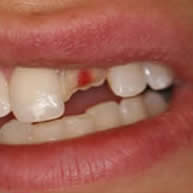Sometimes oral surgery is the best way to treat problems with your teeth, mouth, gums, or jaws. This can include any type of procedure that involves cutting into or eliminating tissue from your mouth. Dental implants, tooth extraction, gum surgery, jaw issues, cleft palate, and diseased tissue are all examples of typical oral surgeries. Usually performed by an oral surgeon and often on an outpatient basis, afterwards patients are responsible for their own care at home. There are some common outcomes that you should expect following most oral surgeries.
Pain
It is normal to experience pain after oral surgery once the anesthesia dissipates. The majority of the pain will occur in the first two days after surgery, but discomfort may linger up to five days. Your oral surgeon might prescribe pain medication to take at home. Follow the instructions for usage carefully, and do not drink alcohol while on the medication. If you feel drowsy, do not drive or perform other hazardous tasks until you quit taking the medicine. If your pain doesn’t begin to improve two days after surgery, consult your surgeon.
Bleeding
Another common result of oral surgery is bleeding, especially for the first few hours. Oozing may occur for up to 24 hours. After about four hours, consult your surgeon if bleeding isn’t controlled by firmly pressing gauze on the area.
Swelling
Your face may swell for the first 24 hours after oral surgery, and it can last up to a week. Hold an ice pack on the swollen area for the first day, alternating 10 minutes on and 10 minutes off. On the second day, switch to a warm compress which will improve blood circulation to the area. Make sure you wait at least a day to switch to heat however, because it can increase swelling during the first day.
Bruising
Another common result of oral surgery is bruising. It doesn’t always happen, but it sometimes develops as swelling decreases. Bruising may last up to 10 days.






